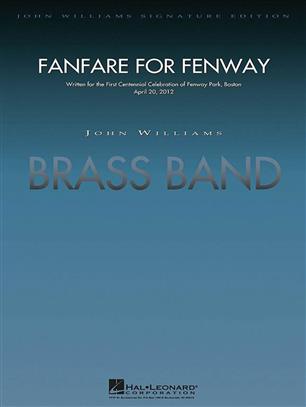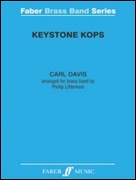Results
-
 £25.20
£25.20Bethena (Brass Quintet)
The Obrasso Brass Quintet Series includes the following parts:Part 1 in BbPart 2 in BbPart 3 in Eb and FPart 4 in Bb TC and C BCPart 5 in Eb TC and C BC
Estimated dispatch 7-14 working days
-
 £33.10
£33.10Wedding Dreams (Brass Quintet)
The Obrasso Brass Quintet Series includes the following parts:Part 1 in BbPart 2 in BbPart 3 in Eb and FPart 4 in Bb TC and C BCPart 5 in Eb TC and C BC
Estimated dispatch 7-14 working days
-
 £25.20
£25.20But Not For Me (Brass Quintet)
The Obrasso Brass Quintet Series includes the following parts:Part 1 in BbPart 2 in BbPart 3 in Eb and FPart 4 in Bb TC and C BCPart 5 in Eb TC and C BC
Estimated dispatch 7-14 working days
-
 £72.99
£72.99Fanfare for Fenway (Brass Band - Score and Parts)
This spectacular tune from John Williams was originally written for the First Centennial Celebration of Fenway Park in Boston. It was transcribed for brass band by Stephen Bulla for the exclusive John Williams Signature Edition series, approved by John Williams himself. A fancy opener for any occasion!
Estimated dispatch 7-14 working days
-
 £25.20
£25.20Thula Baba (Brass Quintet)
The Obrasso Brass Quintet Series includes the following parts:Part 1 in BbPart 2 in BbPart 3 in Eb and FPart 4 in Bb TC and C BCPart 5 in Eb TC and C BC
Estimated dispatch 7-14 working days
-
 £25.20
£25.20Jingle Bells (Brass Quintet)
The Obrasso Brass Quintet Series includes the following parts:Part 1 in BbPart 2 in BbPart 3 in Eb and FPart 4 in Bb TC and C BCPart 5 in Eb TC and C BC
Estimated dispatch 7-14 working days
-
£25.20
Mr Sandman
The Obrasso Brass Quintet Series includes the following parts:Part 1 in BbPart 2 in BbPart 3 in Eb and FPart 4 in Bb TC and C BCPart 5 in Eb TC and C BC
Estimated dispatch 7-14 working days
-
 £25.20
£25.20The Ashokan Farewell (Brass Quintet)
The Obrasso Brass Quintet Series includes the following parts:Part 1 in BbPart 2 in BbPart 3 in Eb and FPart 4 in Bb TC and C BCPart 5 in Eb TC and C BC
Estimated dispatch 7-14 working days
-
 £44.99
£44.99Keystone Kops (Brass Band - Score and Parts)
The Keystone Kops was a series of silent comedies featuring an incompetent group of policemen. They first appeared in the 1912 film Hoffmeyer's Legacy but it was the 1913 feature The Bangville Police that confirmed their popularity. The Keystone Kops were renowned for making mistakes, particularly with a great deal of energy and activity, and all done with a major lack of coordination. Carl Davis's 3-minute tour de force is a fine encore piece!Recorded on Polyphonic QPRL218D Master Brass (Volume Fourteen)Duration: 3:00
Estimated dispatch 7-14 working days
-
 £96.99
£96.99Beecher Variations (Brass Band - Score and Parts)
In this beautiful composition, melodic fragments of the hymn tune Beecher are morphed into a series of variations, showing the melody in various moods from expressive, then quiet and soft, to bright and triumphant in the end. Written as a test piece in the 4th division for the Dutch Brass Band Championships in 2015, the music features challenging solo parts for cornet, soprano cornet, flugelhorn and euphonium. A great work for the concert or contest stage!Duration: 12.00
Estimated dispatch 7-14 working days
